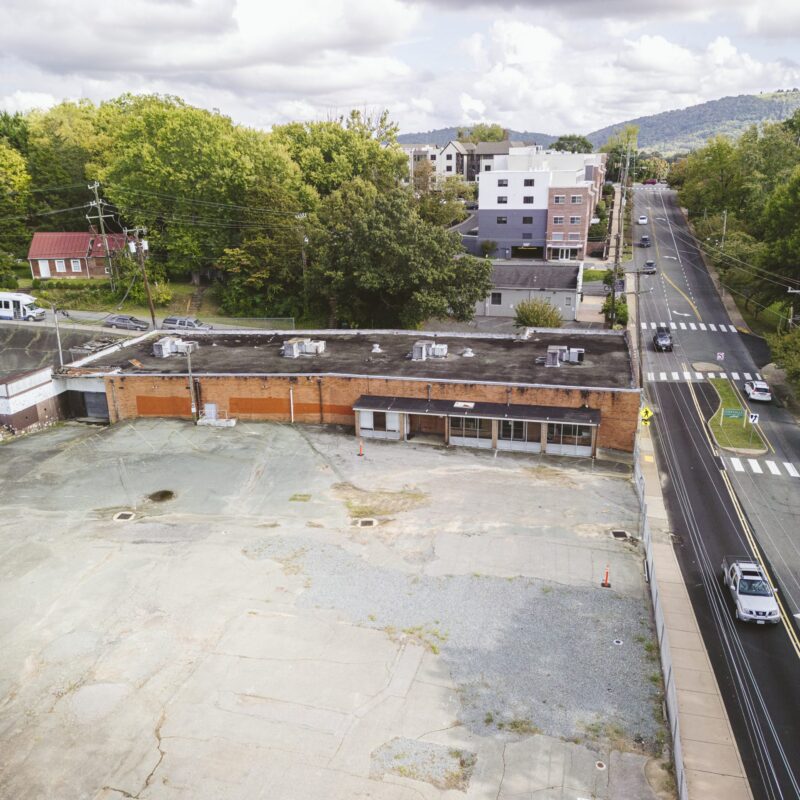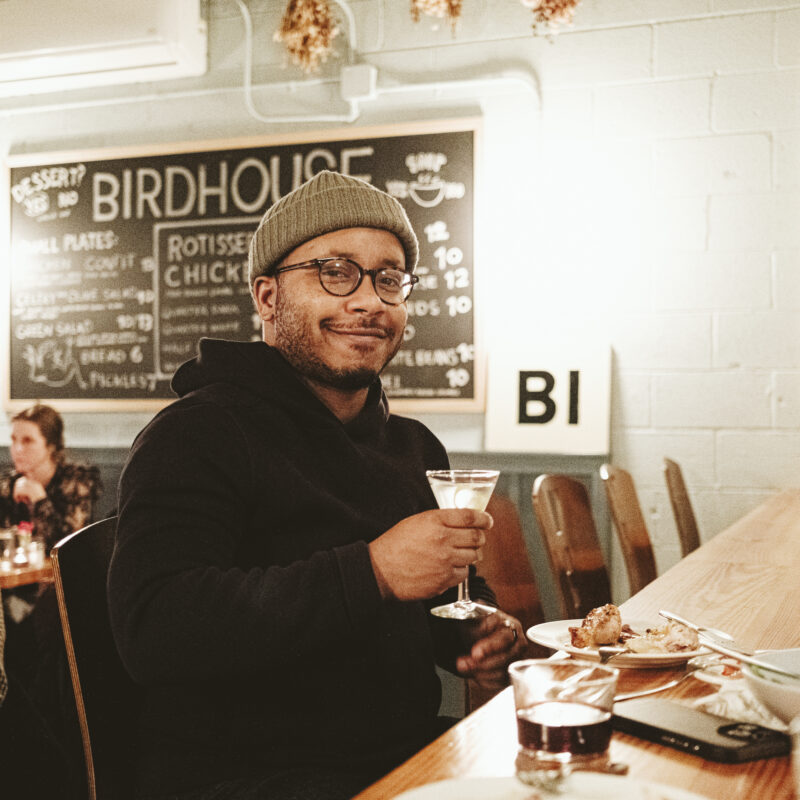Tuesday, September 27
Big Ben to chime in the Senate?
The Washington Post’s “Reliable Source” reports today that politics could be the reason Ben Affleck and Jennifer Garner were in Charlottes-ville four weeks ago. While it’s been widely speculated that the very pregnant Garflecks were house-hunting here, the Post suggests there’s an urgent reason for them to seek residency: State Democrats, “desperately searching for a big name to challenge the re-election bid of rising GOP star Sen. George Allen” want… Affleck! While leaving unanswered the burning question, Have the Dems Lost Their Ever-Loving Minds? the Post demonstrated discernment in other editorial matters, illustrating its story with a photo from C-VILLE Weekly.
Their name is Hackensaw
The Hackensaw Boys’ good karma paid off, as the local bluegrass group’s twangy tunes were featured in tonight’s episode of NBC’s freshman sitcom “My Name Is Earl.” The show stars perennial slackster jackass Jason Lee (Chasing Amy; Almost Famous) as a slackster jackass redneck who wins the lottery and decides to use his fortune to make amends for all the horrible things he’s done to people over the years.
Wednesday, September 28
Forum says Collins trespassed
Today the pro-business Free Enterprise Forum jumped into the fray over the case of Rich Collins handing out political literature in the Shoppers World parking lot in May. The Forum joins the ACLU, The Rutherford Institute and the Thomas Jefferson Center for the Protection of Free Expression in filing briefs in the case. But while those organizations say the site counts as public space, the Forum defends property manager Charles Lebo, who had Collins arrested for trespassing last spring. “The law is clearly on the side of property rights,” says Forum director Neil Williamson. The Forum’s brief says that just because a property is open to the public does not mean that it is public property. If it’s not public property, Williamson says, then rights to free expression are irrelevant.
Thursday, September 29
Mrs. Dalloway RSVPs for VFF
Today Virginia Film Festival Director Richard Herskowitz spilled the details of the event’s 18th annual program, running October 27-30 with the theme “IN/JUSTICE.” The big “get” is British acting legend Vanessa Redgrave (Howard’s End, Mrs. Dalloway), on hand for the United States premiere of her film The Fever. Other regional premieres include Lars Van Trier’s Manderlay, with Danny Glover and Bryce Dallas Howard; Bee Season, starring Richard Gere and Juliette Binoche; and The Matador with Pierce Brosnan. In other news, six buzzed-about but undistributed films have been selected to compete for the VFF’s first-ever jury prize. The picked flick will score $5,000 and screen in one of Regal Cinemas’ New York City theaters. For a full schedule check out www.vafilm.com; tickets go on sale October 17.
Friday, September 30
County college prep program earns foundation $
For six years, CQuest has been helping highly motivated, disadvantaged students from Monticello High School to be the first in their families to attend college. With a focus on loads of personal attention from adult mentors and help navigating study tools, CQuest has sent about 65 seniors to college. The program faced dissolution last year when funding started to run low, but today the Char-lottesville Area Community Foundation announced a $10,000 grant to CQuest. In a press release, CQuest director Rebecca Lamb signaled her relief and appreciation. “I’ve always felt that it is important to offer strong support to those students who, in spite of the disadvantages they face, are working very hard to achieve.”
Saturday, October 1
Cavs surrender 21 points in College Park collapse
Ahmad Brooks was back at linebacker this afternoon in UVA’s second ACC match, at Maryland, but really, who cares? In a shoot-your-TV fourth quarter, the Cavaliers let the Terrapins run over them with 21 points. In sum, Maryland creamed the Cav defense with 33 first downs. Final score: 45-33, leaving UVA 1-1 in the ACC, and Hoos pacing with anxiety as the rest of the season only looks tougher.
Sunday, October 2
Would-be candidates in “phantom election” criticized
In his “Political Notebook” today, veteran Daily Progress political reporter Bob Gibson further probes the strategies of four candidates who are not officially running for a General Assembly seat that is not officially open. Meredith Richards, Connie Brennan, Marshall Pryor and Mike Signer are said to have an eye on the State Senate seat that would be vacated by Democrat Creigh Deeds if he wins the statewide race for Attorney General next month. Gibson describes their delicate proposition: “I’m for Creigh and are you for me?” One week from today, October 9, Richards, who has one state run under her belt (she lost to incumbent Congressman Virgil Goode), will be recognized at a “candidate for General Assembly” reception. “A few Democrats who received the invitation grumbled a bit that campaign money and energy should be going into the Nov. 8 races,” Gibson reports.
Monday, October 3
Quarter-mil to go to another Council study?
City Council meets tonight, and among agenda items is a resolution to allocate $250,000 for a study on the feasibility of an Eastern Connector. At press time, we had to wonder, will anyone stand up tonight to remind Council that some of the five of them were voted in on an anti-road platform? As for invoking the anti-consultant platform…well, we know a lost cause when we see it.
Written by John Borgmeyer from staff reports and news sources.
Baked Alaska
UVA prof Howard Epstein chronicles Arctic climate change
Northern Alaska has long been, by and large, a vast stretch of tundra—perennially frozen ground called permafrost, covered by ice and snow. However, this great white desert is getting warmer, and shrinking under new vegetation.
Since 1996, UVA environmental science professor Howard Epstein has spent most summers in Alaska with other scientists, studying arctic tundra and climate change. Recently, he co-authored a study published by Science Express that offers an explanation for the warmer summers there. C-VILLE met him at his UVA office to discuss warming Alaskan summers and the implications of climate change.—Will Goldsmith
C-VILLE: What did you find that explains this summer warming trend?
Howard Epstein: We found two major contributors that make sense. Most significantly is the increase in the length of the snow-free season. Mostly, snowmelt is starting earlier, on average 2.3 to 3.6 days earlier than in previous decades, and there is also a minor lengthening of the growing season. The other factor is the increase in the shrub extent. Both of those lead to more energy going into the system. It’s a positive feedback loop, which means that more trees and shrubs could amplify atmospheric heating even more.
Why does that mean more energy in the system?
Snow is a surface that reflects radiation. A longer snow-free season means that more radiation, instead of being reflected, is going into the evaporation of water or heating soil, plants and air.
If this keeps happening, it could continue to do the same thing—increase the length of the snow-free season, melt permafrost—causing a shift in ecosystems, with those high polar deserts in danger of being pushed off, of being eliminated, under the northern advance of woody pines and shrubs.
Did you see how this was affecting the lives of people living up in Alaska?
We work with some local indigenous people on a few of our projects over the past decade—they make the same observations. They’ve experienced warmer temperatures than they’ve ever experienced, they see changes in the vegetation. They’ve been through things like thunderstorms that they’ve never seen in the past.
How related is this to humans changing the climate?
The bottom line is that it’s an anthropogenic effect— you can’t explain the cur- rent warming without it. The facts are, we know humans are increasing greenhouse gases in the atmosphere. That’s a fact. It’s not disputable. We know that when you increase greenhouse gases in the atmosphere, you change the energy balance of the planet and the atmosphere. That’s a fact. That’s physics. And that necessarily changes the climate. Do we want to do that? No. We need to curb our greenhouse gas emissions, and we need to have done it yesterday.
Wolfe in sheepskin’s clothing
White-clad novelist to speak at UVA
Last week UVA announced that acclaimed writer Tom Wolfe will speak at the Valedictory Exercises on May 20. The event occurs during finals weekend and includes the announcement of class awards and the class gift. Wolfe continues the ceremony’s cavalcade of literary greatness—past speakers include authors David Baldacci, Ron Suskind and “60 Minutes” personality Andy Rooney.
Wolfe, 74, is a native of Richmond credited with fath-ering “New Journalism,” a writing technique that combines literary style and form with factual reportage. He is the author of three novels: Bonfire of the Vanities (1987), A Man in Full (1998) and I Am Charlotte Simmons (2004). His most recent novel chronicles sex, booze and hierarchy at a fictitious college.—John Borgmeyer
Names can never hurt me
Speech codes won’t fly at UVA
In the wake of nationally publicized racial incidents on campus, UVA President John Casteen says an African-American parents group from Northern Virginia has advocated speech codes to punish students who utter “intimidating language.”
Speaking to the Faculty Senate on Tuesday, September 27, Casteen said some colleges began adopting speech codes to curb “hate speech” in the late 1980s and early ’90s, when political correctness crept into fashion. Any attempt to ban racist or offensive speech would probably not be allowed at UVA, Casteen said, since the school, as a public institution, cannot abridge First Amendment rights.
Several public universities have tried to establish speech codes, but all have been struck down in court, says former UVA President Robert O’Neil, who now directs the Thomas Jefferson Center for the Protection of Free Expression. “The courts have found speech codes to be overbroad, or too vague, or both,” O’Neil says.
UVA has been in an uproar in recent weeks, ever since students reported that others have yelled racial epithets from a passing vehicle, and also that they wrote messages dissing blacks, gays and Christians on students’ message boards.
A code that banned what is known as “hate speech” at UVA would be “very risky
business,” says O’Neil. The University can, and does, prohibit verbal threats—and O’Neil notes that the First Amendment does not protect speech designed to start a fight or provoke lawless behavior. “The alternative to a speech code is to make harsher penalties for an abuse driven by race, gender, or sexual orientation,” says O’Neil.
There is no evidence to suggest the perpetrators are students. If they are, and they are caught, they could be punished by the Judiciary Committee for violating UVA’s rules prohibiting verbal threats. Punishment can range from a verbal reprimand to suspension and expulsion. Last Tuesday Casteen said he had consulted UVA’s General Counsel in the Attorney General’s office, who advised him that any speech code would be unlikely to stand up in court.—John Borgmeyer
Room and board
New housing options in store for Belmont
Most people know Belmont as the neighborhood where real estate values have taken the most dramatic upward leaps. Soon, however, there will be some new living options besides overpriced $350,000 bungalows in the popular borough east of Downtown.
In the coming months developers will begin construction on several Planned Unit Developments, or PUDs, in Belmont. Such projects have caused controversy elsewhere in the city, as some residents have protested that multi-storey, multi-unit buildings didn’t fit with single-family homes in neighborhoods like Fifeville. In Belmont, however, developers seem to have done some front-end public relations work with the Belmont Neighborhood Association.
“We’ve had at least three developers, if not more, come to neighborhood meetings since January, telling us what they’re trying to do,” says Association President Chris Gensic. “There’s a good conversation going on.”
Gensic says people in Belmont have feelings similar to other city residents. “They don’t mind new houses, but they don’t like big apartment buildings.” To that end, the PUDs coming to Belmont feature mostly detached cottages.
“Our concept is the antithesis of the subdivision,” says Bill Atwood, the architect for Lane Bonner’s Belmont Cottages project, which are slated for the southern corner of Palatine and Avon. It will include 15 homes between 900 and 1,500 square feet built on a triangle-shaped lot with parking in the middle. The City Planning Commission will consider Bonner’s request for rezoning at its next meeting on Tuesday, October 11.
There are three other PUDs coming to Belmont. Also on Avon, across Palatine from Belmont Cottages, is Avon Terrace. The eight units, developed by Jim Moore, are already under construction.
The City is currently considering two other PUDs in Belmont: Developer Charlie Lewis wants to build Eddins Cottages, 10 units on the corner of Chestnut Street and Carlton Avenue. Developer Nassimo Rampin wants to put 21 units on Palatine, adjacent to Bonner’s project.
Atwood touts PUDs as “the answer” to the City’s desire for in-fill development and residents’ desire for lower-priced homes. But because some developers have used the PUD designation as a way to cram two or three houses on a single-family lot, the City is considering new rules to clarify the PUD approval process.—John Borgmeyer
For those just passing through…
Will Belmont become a hostel environment?
Mare Hunter wants to turn a trio of houses in Belmont into hostels for travelers in Charlottesville. The houses are located at 625 Monticello Rd., as well as 702 and 709 Sonoma St. They will be the first such rooming houses in Charlottesville, says Planning Commission Chair Cheri Lewis. “I think it’s a great idea,” Lewis says. “They’re pretty close to Monticello, and surprisingly I think the neighbors are behind it.”
Hunter, who declined comment, has told City planners that her own travels inspired her to create hostels in Charlottesville. The Planning Commission will consider Hunter’s request on Tuesday, October 11.—J.B.
Riding shotgun
Hunting season’s coming and statewide candidates like them some guns
Two big events are fast approaching come November: Election Day and deer-hunting rifle season. Last year, according to the Virginia Department of Game and Inland Fisheries, 250,000 big-game hunting licenses were issued statewide. It’s not surprising, then, that candidates seeking statewide office are eager to arm themselves with endorsements from Virginia “sportsmen.”
Yet those who hunt in Virginia’s rural areas have a different view of gun politics than people in Virginia’s cities, where guns often lead to violent crime. According to federal statistics, in 2002 there were 806 gun-related deaths in Virginia, and in 2000 1,129 guns used in crimes nationwide were identified as having been purchased in Virginia. Last year, the Brady Campaign, the leading gun control organization, gave Virginia a “C-“ on the issue, based on the Commonwealth’s lack of background checks when guns are sold from individual to individual, and the absence of mandatory child safety locks on handguns.
Although there are approximately 192 million privately owned firearms in the United States, according to the Brady Campaign, few federal laws regulate firearms. The federal ban on assault weapons expired a year ago and has not yet been renewed. In general, the gun issue is left to the discretion of state and local governments.
Currently, one must be 18 or older to own or purchase a firearm, and there’s a one-handgun-per-month “limit” in Virginia. Lawsuits against the gun industry are prohibited.
Locally, Charlottesville has no additional ordinances. Albemarle, however, adds two caveats to existing State and federal laws: no hunting within 50 feet of the road and no carrying of a loaded firearm in a vehicle.
To prepare for hunting season and election fever, C-VILLE asked the statewide candidates their positions on the Second Amendment.
GOVERNOR:
Tim Kaine, Democrat
Although Kaine got a big fat “F” from the National Rifle Association in the primaries, “he is a strong supporter of the Second Amendment and would not advocate or support any new anti-gun laws,” says his press secretary, Delacey Skinner. Skinner dismisses the NRA’s rating as a partisan tactic and says, essentially, that Kaine supports the status quo when it comes to guns. For example, Skinner says that as the law stands one can bring an unloaded gun to a high school parking lot and keep it in a locked trunk and that’s A-O.K. with Kaine.
To convince people just how pro-Second Amendment he is, Kaine is pushing his involvement, while mayor of Richmond, with one of Charlton Heston’s favorite programs, Project Exile, which focuses on cracking down on criminals who used guns as opposed to limiting gun rights or strengthening gun control.
Jerry Kilgore, Republican
In his party’s primary race, Kilgore got the “A” and the endorsement from the NRA, and the NRA anticipates releasing its endorsements in the governor’s race this week. While Kilgore touts his support of hunting and fishing, spokesperson Tim Murtaugh says Kilgore also “recognizes that the Second Amendment goes beyond hunting and fishing,” and into the realm of personal protection for “law-abiding citizens.”
In short, Murtaugh characterized Kilgore’s position as “criminals will be criminals,” and that background checks for transactions between private individuals aren’t needed because that’s not how “criminals” buy their guns. As for child safety locks, Kilgore supports their availability, but not making them mandatory.
Russ Potts, Independent
Kilgore will probably snag the NRA’s endorsement for governor, but Pott’s Policy Director Don Jones says that’s just because his man isn’t on a major party ticket. In fact, in state senate campaigns Potts was always endorsed by the powerful gun lobby. According to Jones, Potts’ stance on the issue is that the current laws on the books are sufficient and that Potts would not support new gun control legislation. However, said Jones, Potts would support legislation requiring firearm safety training for everyone who wants to purchase or operate a gun.
LIEUTENANT GOVERNOR :
Leslie Byrne, Democrat
Byrne has supported legislation that proposed keeping guns out of schools, bars and courthouses, and this, says campaign manager Joe Shafer, is why the NRA gave her an “F” in the primaries and is expected to endorse her opponent Bill Bolling this week. Byrne does, however, own a rifle and shotgun for hunting, says Shafer, and “firmly believes in the right to bear arms.”
Bill Bolling, Republican
Bolling got the NRA’s nod in the primaries along with an “A” rating and he’s expected to get the endorsement over Byrne this week as well. By press time, his campaign had not returned repeated calls for comment.
ATTORNEY GENERAL
Creigh Deeds, Democrat
According to the NRA, Deeds is the Dem for guns. Deeds got an “A” from the NRA—the only Democratic candidate to score so high in the statewide race—and the association’s first endorsement in the statewide race. According to Deeds’ spokesperson, Peter Jackson, the former state senator from Bath County owns numerous guns and rifles primarily for hunting, but recognizes the need and right to use those firearms for self-protection as well. Jackson says that Deeds does not believe there should be any new gun laws in Virginia and thus does not support more sweeping background checks or mandatory child safety laws. Deeds’ position is enforcement of the status quo.
Bob McDonnell, Republican
In the primaries McDonnell got a “B” from the NRA. However, since Deeds got the official endorsement, chances are that McDonnell’s pretty bummed. But we can’t say for sure because by press time his people had not returned repeated phone calls.—Nell Boeschenstein
Bad medicine
Former UVA medical prof accused of harassing student
On Wednesday, September 28, Martin Straume, a former UVA associate professor of research in the de-partment of internal medicine, was charged with malicious wounding, stalking, invasion of privacy, computer harassment and placing threatening phone calls. He was re-leased on $3,500 bail and will appear in Albemarle General District Court at 9:30am on November 8.
A former student of Straume’s, Kath-erine Ross, filed the complaints in mid-September; Straume resigned from the University on September 21. The two
had allegedly been having an affair
and according to the complaint filed with the court, when Ross, a grad student,
tried to end things with Straume last June the harassment began.
“He called me and told me that he had read my e-mails from folders in my personal UVA account,” Ross wrote. “He proceeded to curse me out and demand information regarding what he read.”
The complaint also details how, while on her motor scooter, Ross encountered Straume in his car and how he “swerved too close to me while speeding, I believe in an attempt to scare me.” She also wrote how, via e-mail, Straume wished her “great bodily and emotional harm, that he wants me to leave the University, that he will enjoy my failure, etc…”
According to UVA’s handbook, the University’s policy re-garding student-professor relationships is that “it is the responsibility of faculty members to avoid engaging in sexual relationships with or making sexual overtures to students over whom they are in a position of authority….” Carol Wood, University spokesperson, said that “all faculty are well aware of this policy.” She declined to comment on the case since it is an ongoing legal matter.
At press time Straume had not returned calls for comment.—Nell Boeschenstein
Law imbibing citizens
Casteen cites alcohol as contributing factor in recent racial incidentsAt the Faculty Senate meeting on Monday, September 26, UVA President John Casteen postulated that the recent racial incidents on campus could have been aided and abetted by alcohol.
“The people doing this stuff are not hiding behind the First Amendment,” said Casteen. “They are hiding behind bushes and bathroom stalls.” A phenomenal amount of bad behavior on campus, Casteen says, “seems to be the result of excessive amounts of alcohol.”
He went on to express his amazement over the number of arrests he sees on police reports that are alcohol related, and how the University’s current policies aimed to curb alcohol consumptions simply aren’t working.
Casteen was suggesting that alcohol education and moderation is also a form of crime prevention. Since Casteen is trained as an English professor and not a criminologist, C-VILLE took his theory to law enforcement professionals and asked if UVA’s president was on to something.
“Historically, if you look at crimes, alcohol is oftentimes a factor in those crimes and the University is no different,” says Sgt. Melissa Fielding of the UVA police department.
Fielding went on to note that many law enforcement agencies, UVA’s included, offer alcohol-education seminars and work closely with treatment centers on referrals.
National data from the U.S. Department of Health and Human Services also backs up Casteen’s assertion. According to their stats, alcohol is a factor in 62 percent of assaults, 54 percent of murders and attempted murders and 48 percent of robberies; 42.2 percent of jail inmates convicted of rape admitted being under the influence of alcohol and/or other drugs at the time of the offense.—Nell Boeschenstein



